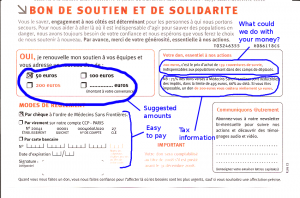Things to learn for GNOME?
November 20, 2008 6:42 pm gnome, marketingHaving made a donation previously to Medecins Sans Frontieres, I occasionally receive mail from them solliciting donations. After one year when I didn’t give anything, I received a letter asking if I was unhappy with MSF and the work they were doing, with a detailed presentation of their major actions, and today, just in time for the end of the year, I received another mailing asking if I wanted to give again this year.
The entire mailing fascinated me, especially their donation form.
There was a bunch of stuff I found interesting about this. The letter emphasised that MSF gets very little public funding, and that 99.6% of its funding comes from private benefactors. I got a small glossy newsletter highlighting some of the most important work the organisation has done over the year, and on the donation form itself, there is a suggested amount of €200, which I thought was a bit high. But beside it, they talk about what they can do with that, and how much the donation will really cost you if you pay taxes (and most people do) – in short, if you give €100 to MSF, you’re actually giving them €25 of your own money, and €75 which you would otherwise be paying in taxes.
In other words, they simultaneously speak to your heart and your pocket. Nice work. In addition, they include a postage-paid envelope for you to return your donation. It’s as easy as write a cheque, put it in an envelope, post, done. Having to address the envelope and search for a stamp are barriers to donations, so they take them away.
They also include a brochure for their line of Christmas cards – another money-maker which is also free viral marketing for them. Every occasion is good for raising money for a good cause.
While the GNOME Foundation and MSF are very different organisations, I think there are lessons to learn for the foundation across the board here. We need to keep track of former donors and remind them why they gave, what we’re doing, and ask them to give again. We need to make it as easy as possible, within our means, for them to give. And we need to elaborate the value proposition: what do we do with the money, what good work are you supporting?
These are all things which we’ve been doing, or have done partially, in the past, but seeing all of the steps put together in a simple, nice package really brought home to me how much we need to leverage our donors – they’re people who believe so much in us that they’ve given money, and they can be our best ambassadors.

November 20th, 2008 at 8:14 pm
If I can pay money and have my bugs’ priorities boosted, that’s something I’d seriously consider..
November 20th, 2008 at 11:00 pm
Great blog post, and this actually reminded me of bug #463742 (http://bugzilla.gnome.org/show_bug.cgi?id=463742)
November 21st, 2008 at 10:11 am
IMO it’s a disaster to send unsolicited email to people to have donated in the past. Unless the donor explicitly asked you to be informed, you must not send them email, ever.
So if you seriously consider to do this, then you need to include a toggle in the donation form that people can use to opt-in for future emails.
November 21st, 2008 at 10:19 am
Note that in many jurisdictions you aren’t even allowed to keep the email address and other personal data from a donor longer than necessary. Necessary is probably the amount of time you need to send an email thanking for the donation. After doing that you should definitely delete the information unless the donor gave you explicit permission to keep your data.
Even if this is not required by your laws, it is still a good rule to follow. Every collection of personal data bears the risk of getting into the wrong hands. So don’t collect personal data that you don’t need.
November 21st, 2008 at 12:29 pm
@Sven: I know that you feel this way – you made that clear last year. But this is standard operational procedure for every single charity out there – allow people to opt out, of course, but when people give money to your organisation, it is a natural assumption to make that they want to find out what you’re doing with the money. Repeat donations are an important revenue source for most charities. They’re also an important vector for your message.
November 21st, 2008 at 1:08 pm
@Dave: what about setting up automatic monthly donation ?
I’m doing that for the french Red Cross: each month, 10€ is automatically transfered from my account to theirs, without them needing to send me unsollicited email.
(and as you know, in France, you can deduce 75% of the money you give to charities from you taxes, so in the end of the year, I’ve only given 30€ 🙂
I think that’s a great way to help on a regular basis, allowing the donor to manage his budget efficiently.
November 21st, 2008 at 1:51 pm
People will find out what you are doing with the money without someone sending them unsolicited emails. It is absolutely unacceptable to do that. These people have given you money, not the right to keep their private data and to be annoyed by mails they did not ask for.
If you insist on keeping and using the data of donors, then it is absolutely required that this fact becomes clear when someone makes a donation. And you should make it easy to opt out.
And really, only because everyone does it, that does not make it any better. Data retention is evil.